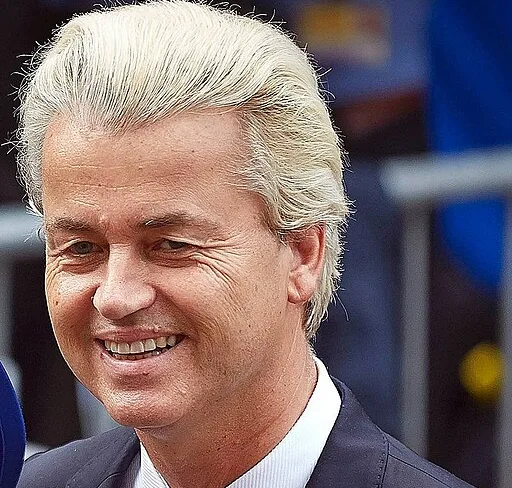Geert Wilders’ PVV party anticipates a significant increase in seats despite voter apathy
As Dutch voters head to the polls for the European elections, Geert Wilders‘ far-right Freedom Party (PVV) is predicted to make substantial gains, increasing its seats in the European Parliament from one to eight. This election, spanning four days and involving 27 countries, will elect 720 Members of the European Parliament (MEPs) and shape the next European Commission.
The centre-right European People’s Party, led by Ursula von der Leyen, is expected to remain the largest group, followed by the centre-left Socialists and Democrats and the liberals of Renew Europe. However, the spotlight is on the potential rise of populist and far-right parties, which, while unlikely to gain direct power, could significantly influence mainstream politics.
Embed from Getty ImagesIn The Hague, Wilders campaigned vigorously, emphasizing issues of asylum and national sovereignty. This marked a shift from his usual anti-EU stance, reflecting PVV’s recent compromises in coalition government formation, including dropping the call for a “Nexit” referendum.
Polls suggest PVV is now on par with the Green-Left-Labour alliance, led by Frans Timmermans, who advocates for a “free, sustainable, safe, and democratic EU.” Despite this, Dutch interest in the European elections remains low, with 2019 turnout at just 42%, below the EU average. This apathy persists even as the country welcomes a new prime minister, Dick Schoof.
Louise van Schaik of the Clingendael Institute described the campaign as lacklustre, comparing Dutch sentiment towards the EU to British attitudes pre-Brexit. Wilders, now supporting a far-right supergroup in the European Parliament, faces challenges due to internal rivalries and policy differences within far-right factions.
PVV belongs to the Identity and Democracy (ID) group, alongside Marine Le Pen’s National Rally and Matteo Salvini’s League, among others. However, the group has experienced internal strife, recently expelling Germany’s AfD. In contrast, the European Conservatives and Reformists (ECR) group, which includes Giorgia Meloni’s Brothers of Italy and Poland’s Law and Justice party, presents a more EU-constructive stance.
Political scientist Sarah de Lange notes the far-right’s desire for reduced EU regulation while still benefiting from subsidies. The critical factor for PVV will be voter mobilization, historically a challenge for the party. Pollster Sjoerd van Heck highlights the irony of urging votes for a party advocating EU exit.
As the Dutch polls open, Wilders’ supporters, like Sermin Civi, express frustration over housing and immigration. However, Civi admits to rarely voting, underscoring the challenge PVV faces in converting support into electoral success.
Voting continues across the EU until Sunday, with results anticipated in the evening, potentially reshaping the bloc’s political landscape in significant ways.
Analysis:
Political Impact: Geert Wilders’ potential success in the European elections signals a significant shift in Dutch and broader EU politics. The far-right’s rise could influence mainstream parties to adopt stricter stances on immigration and national sovereignty. While the PVV’s gains might not secure direct power, their increased presence can disrupt legislative processes and negotiations within the European Parliament, pushing for less EU intervention in national matters.
Social Reflection: Wilders’ campaign reflects societal tensions over immigration, economic stability, and national identity. His anti-immigrant rhetoric resonates with voters like Sermin Civi, who feel marginalized by current policies. The rise of PVV highlights a growing divide in Dutch society, where fears over housing and job security fuel support for far-right ideologies. This societal split underscores the need for policies addressing the root causes of such discontent.
Psychological Aspect: The potential rise of PVV may evoke fear and uncertainty among minority communities and progressive voters. For far-right supporters, Wilders represents a voice for their frustrations, providing psychological validation. Conversely, his rhetoric can exacerbate social tensions, leading to increased anxiety and division. Understanding these psychological dynamics is crucial for addressing the underlying causes of far-right support.
Sociological Angle: From a sociological perspective, Wilders’ appeal lies in his ability to articulate the grievances of those feeling left behind by globalization and liberal policies. His rise mirrors a broader European trend where populist leaders gain traction by promising to reclaim national sovereignty and protect local jobs. This phenomenon reveals underlying societal fractures and the challenges of maintaining social cohesion in diverse, modern societies.
Fashion Culture: While Wilders and the PVV do not directly influence fashion trends, their rise reflects broader cultural shifts towards nationalism and traditionalism. This cultural shift can manifest in fashion through a resurgence of local, traditional attire, and a rejection of globalized, cosmopolitan styles. Fashion, in this context, becomes a subtle battleground for expressing political and cultural identities
